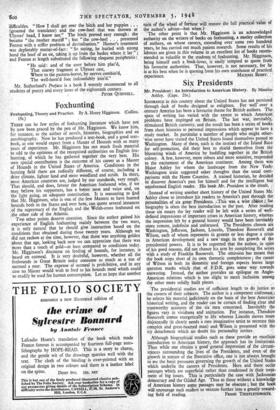Six Presidents
IGNORANCE in this country about the United States has not persisted through 'lack of books designed to enlighten. For well over a century America has been a favourite theme for British authors. The- spate of writing has varied with the extent to which American problems have impinged on Britain. The last war, inevitably, stimulated British curiosity, and the result has been a series of books from short histories to personal impressions which appear to have a
ready market. In particular a number of people who might other- .
wise never have visited the United States found themselves posted to.
Washington. Many of these, such is the instinct of the Island Race for self-protection, did their best to shield themselves from the blustering winds of America by huddling together in the British colony. A few, however, more robust and more sensitive, responded to the excitement of the American continent. Among them was Major Ashley for whom the landscape from the New York- Washington train suggested' other thoughts than the usual com- parisons with the Home Counties. A trained historian, he decided to discover America's past for himself and for the intelligent but uninformed English reader. His book Mr. President is the result.
Instead of writing another short history of the United States Mr, Ashley chose to introduce his readers to America's past through the personalities of _six great _Presidents. , This was a wise cheice for biography is often the best introduction to the past. After reading these six essays the lay reader will be left with a series of well- defined impressions of important crises in American history, whereas the impression left by a general history would have been -inevitably more remote, indefinite and unfocused. The Presidents chosen are Washington, Jefferson, Jackson, Lincoln, Theodore Roosevelt and Wilson, each of whom represents in greater or less degree a crisis in -American development and a new ' stage in the growth of the presidential powers. It is to be regretted that the author, in spite of his good reasons, did not chance his arm by completing ihe series with a study of Franklin Roosevelt. The omission has meant that the book stops short of its own thematic completeness ; the career of Wilson in both its domestic and foreign aspects leaves large question marks which that of F.D.R. goes some way towards answering. Instead, the author provides an epilogue on Anglo- American relations which is too slight to merit inclusion among the other more solidly built pieces.
The presidential studies are of sufficient length to do justice to the careers of their subjects. The author is a competent craftsman.; he selects his material judiciously on the basis of the best American historical writing, and the reader can be certain of finding clear and trustworthy accounts of the six men concerned. Inevitably the figures vary in vividness and animation. For instance, Theodore Roosevelt comes energetically to life whereas Lincoln moves more disjointedly (it clearly needs a rare imaginative artist to recreate this complex and great-hearted man) and Wilson is presented with the icy detachment which no doubt his personality invites.
Although biographical studies such as these provide an excellent introduction to American history, the approach has its limitations. Thus while one obtains a good general impression of the circum- stances surrounding the lives of the Presidents, and even of the giowth in stature of the Executive office, one is not always brought to see the basic pressures governing the growth of the United States which underlie the careers of Presidents. Here and there occur passages which are superficial rather than condensed in their treat- ment of big issues. This is particularly the case with Jacksonian democracy and the Gilded Age. Thus to those without a knowledge of American history some passages may be obscure ; but the book will encourage such readers to venture further into a greatly reward-










































 Previous page
Previous page